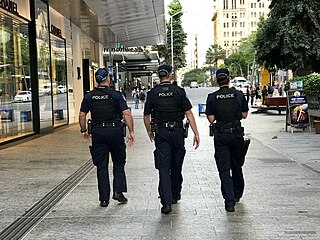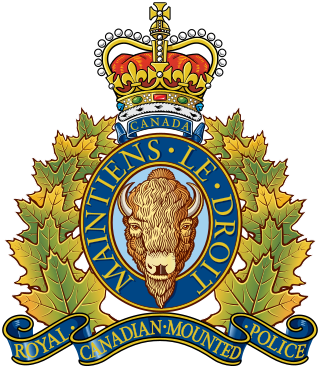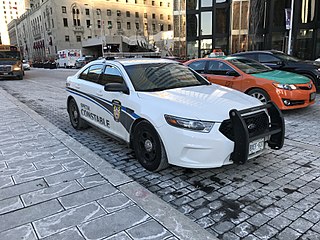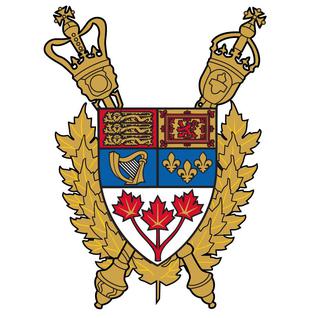
The Royal Canadian Mounted Police is the national police service of Canada. The RCMP is an agency of the Government of Canada; it also provides police services under contract to 11 provinces and territories, over 150 municipalities, and 600 Indigenous communities. The RCMP is commonly known as the Mounties in English.
Environment and Climate Change Canada is the department of the Government of Canada responsible for coordinating environmental policies and programs, as well as preserving and enhancing the natural environment and renewable resources. It is also colloquially known by its former name, Environment Canada.

State police, provincial police or regional police are a type of sub-national territorial police force found in nations organized as federations, typically in North America, South Asia, and Oceania. These forces typically have jurisdiction over the relevant sub-national jurisdiction, and may cooperate in law enforcement activities with municipal or national police where either exist.

Law enforcement in Canada is the responsibility of police services, special constabularies, and civil law enforcement agencies, which are operated by every level of government, some private and Crown corporations, and First Nations. In contrast to the United States or Mexico, and with the exception of the Unité permanente anticorruption in Quebec and the Organized Crime Agency of British Columbia, there are no organizations dedicated exclusively to the investigation of criminal activity in Canada. Criminal investigations are instead conducted by police services, which maintain specialized criminal investigation units in addition to their mandate for emergency response and general community safety.

"E" Division is the division of the Royal Canadian Mounted Police in the province of British Columbia, Canada's westernmost province. It is the largest police body in the province, providing federal and provincial services throughout the province and policing all but 12 municipalities. In some urban areas, some municipalities have their own police forces while neighbouring ones contract with E Division. For example, Richmond is patrolled by E Division while neighbouring Vancouver has its own police force; both organizations contribute members and resources to various regional initiatives. E Division is the largest RCMP division, with 127 local detachments.
Integrated National Security Enforcement Teams are Canadian counterterrorist, counter-foreign interference, and counter-espionage units operating under the auspices of Public Safety Canada. These federal investigative teams were formed in 2002 in response to the September 11 attacks.

The British Columbia Sheriff Service (BCSS) is a provincial law enforcement agency overseen by the Ministry of the Attorney General in the Canadian province of British Columbia. Founded in 1857, it is the oldest law enforcement agency in the province. Sheriffs are provincial peace officers appointed under the BC Sheriff Act and BC Police Act with authority to enforce all relevant federal and provincial acts, including the criminal code throughout British Columbia while in the lawful execution of their duties.

The Alberta Sheriffs Branch is a provincial law enforcement agency overseen by the Ministry of Public Safety and Emergency Services of the province of Alberta, Canada. Under the authority of the Peace Officer Act, Alberta Sheriffs are provincial peace officers with jurisdiction over the province of Alberta. The premier of Alberta has the authority to grant emergency police powers to all Alberta sheriffs during major emergencies within the province. The Alberta Sheriffs Branch is the largest sheriff service in Canada.

An Integrated Safety and Security Group (ISSG), formerly known as an Integrated Security Unit (ISU) is a unified and coordinated task force comprising multiple law enforcement agencies in Canada. It is responsible for coordinating the safety and security for major national and international events, including the G7 Summit and the Olympics. This administrative and operational entity was first created by the Royal Canadian Mounted Police (RCMP) in 2003.

A special constable or special police constable can refer to an auxiliary or part-time law enforcement officer or a person who is granted certain (special) police powers.
The RCMP "C" Division is the Royal Canadian Mounted Police division responsible for federal policing in the Province of Quebec. Approximately 1,500 police officers, civilian members and public servants work to a number of different lines of effort, including financial integrity, national and border security, and organized crime enforcement. The RCMP in Quebec relies on dedicated resources to conduct investigations, provide VIP protective services and undertake crime prevention initiatives in communities in all areas of Quebec.

The Parliamentary Protective Service is the office of the Parliament of Canada which provides physical security within the Parliamentary Precinct in Ottawa, Ontario.
The D Division is the division of the Royal Canadian Mounted Police responsible for federal policing in Manitoba and, at times, northwestern Ontario. Headquartered in Winnipeg, the division is commanded by Assistant Commissioner Scott McMurchy and consists of 1089 police officers and 438 support staff.
Brenda Lucki is a Canadian retired police officer who served as the 24th commissioner of the Royal Canadian Mounted Police from April 2018 to March 2023. She is the first woman to permanently hold the position.
The police in Canada's ranks differ according to the different police forces and depend on different laws at the federal, provincial, and municipal levels.

The Office of the High Sheriff of Newfoundland and Labrador is a provincial law enforcement agency overseen by the Minister of Justice and Public Safety in the province of Newfoundland and Labrador, Canada. Founded in 1729, it is the oldest law enforcement agency in Canada. Sheriffs are provincial peace officers appointed under the Sheriff's Act, 1991 with authority to enforce all relevant federal and provincial acts including the criminal code throughout Newfoundland and Labrador while in the lawful execution of their duties.
The National Police Federation (NPF) is the police union representing Regular Members and Reservists of the Royal Canadian Mounted Police (RCMP) below the rank of Inspector. The NPF represents about 20,000 RCMP Members serving across Canada and internationally.
Michael Robert Duheme is the 25th Commissioner of Royal Canadian Mounted Police, having taken office in an interim capacity, following the retirement of Commissioner Brenda Lucki on March 17, 2023, and permanently as of the Change of Command ceremony held on May 25, 2023.










